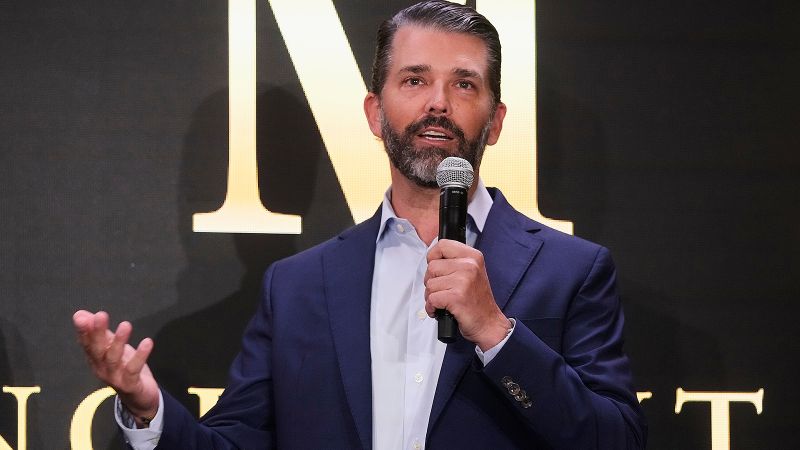The Trump Organization introduced its new wireless service, Trump Mobile, on Monday, claiming that its upcoming T1 smartphone would be “proudly designed and built in the United States.” However, industry experts have expressed doubts regarding the feasibility of manufacturing a smartphone in the US under the proposed specifications, price points, and timeline shared by Donald Trump Jr. and Eric Trump during the announcement.
Observers noted notable resemblances between the T1’s features and those of an existing Chinese smartphone. Todd Weaver, CEO of Purism—one of the few companies manufacturing phones domestically—stated, “Unless the Trump family secretly built out a secure, onshore or nearshore (fabrication) operation over years of work without anyone noticing, it’s simply not possible to deliver what they’re promising.”
CNN has reached out to the Trump Organization for additional clarification. According to the company, President Donald Trump is not involved in the day-to-day operations, which are overseen by his sons. This announcement coincides with the President’s ongoing push to revive tech manufacturing jobs in the United States, where he has urged companies like Apple and Samsung to shift their production back home, adding that those who manufacture abroad would face tariffs of at least 25%.
The Trump family has reiterated on Trump Mobile’s website and in a statement made at Trump Tower that the phone will be “Made in the USA.” However, in a subsequent interview clip with conservative media figure Benny Johnson, Eric Trump mentioned that “eventually all the phones can be built in the United States of America.” CNN has inquired whether the T1 will initially be manufactured domestically.
Both Weaver and another expert, Max Weinbach—an analyst with Creative Strategies—independently conveyed to CNN that the T1 smartphone closely resembles the Revvl 7 Pro 5G, manufactured by the Chinese company Wingtech, which provides assembly services for smartphones and other devices. The Revvl 7 Pro 5G is available for approximately $169 on Amazon.
Weinbach and Weaver’s observations stem from specifications on Trump Mobile’s website, which reveal similarities in the phones’ body, battery life, and camera capabilities. Although there is no direct evidence linking the T1 to the Revvl 7 Pro 5G or any other specific foreign device, Weinbach noted, “There (are) only realistically four or five smartphone ODM (original device manufacturers) that would actually be able to manufacture something like this. All of them are based out of China.”
Comparatively, the Revvl model matches the T1’s screen dimensions, battery capacity, and storage, and both include a headphone jack—a rarity among current smartphones. Another device, the Vtex Smart Phone, showcased on Made-in-China, shares nearly identical specifications with the T1, albeit with some variations in memory and display components. CNN has also reached out to Shenzen Vitek Electronics, the manufacturer of the Vtex Smart Phone, for comments.
Weinbach explained that it is common for companies to modify devices created by ODMs for sale under their brand names, noting, “A lot of them share the same components, parts, boards and antenna hardware. So, you can swap out a couple of things.”
In a press release, the Trump Organization clarified that Trump Mobile’s products are not directly designed, developed, manufactured, distributed, or sold by the Trump Organization or its affiliates.
Ryan Reith, group vice president at the International Data Corporation’s Worldwide Device Tracker, remarked that manufacturing a phone in the US by the September 2025 launch would be challenging, primarily due to the absence of necessary fabrication plants. Most smartphone components would likely have to be sourced internationally. He stated, “Any phone (that) is going to be sold in September, or shipped in September into the US, the majority of it’s not going to be manufactured in the US. That’s a given.”
President Trump has been advocating for Apple to relocate iPhone production to the United States, which would entail a significant shift in the supply chain away from China and India. Such a transition would not only require altering factory resources but would also involve a workforce in the US that lacks the specialized skills present in those countries, leading to potential price increases or design alterations for the iPhone, as some analysts have estimated.
Weaver mentioned that over the past year, intermediaries associated with the Trump Organization had explored collaborations with Purism to understand the requirements for US-based smartphone manufacturing. Purism’s Liberty Phone, which retails for $1,999, promotes itself as a secure “Made in America” device, although even it requires some components sourced from abroad.
“There are certain areas where you’re going to still need to have a global supply chain. One example is a crystal that goes in our GNSS chip or GPS chip. That single crystal is only manufactured in China,” Weaver pointed out.
Weaver also cautioned that the Federal Trade Commission holds “strict guidelines” regarding claims of a product being “Made in the USA.” He added, “I do believe there will be a massive amount of back pedaling that goes on. Just to manufacture a phone in the US with the chipsets you’re actually getting, purchase and support with the US supply chain is a massive undertaking, and that’s also the reason why we happen to be the only ones doing it.”

